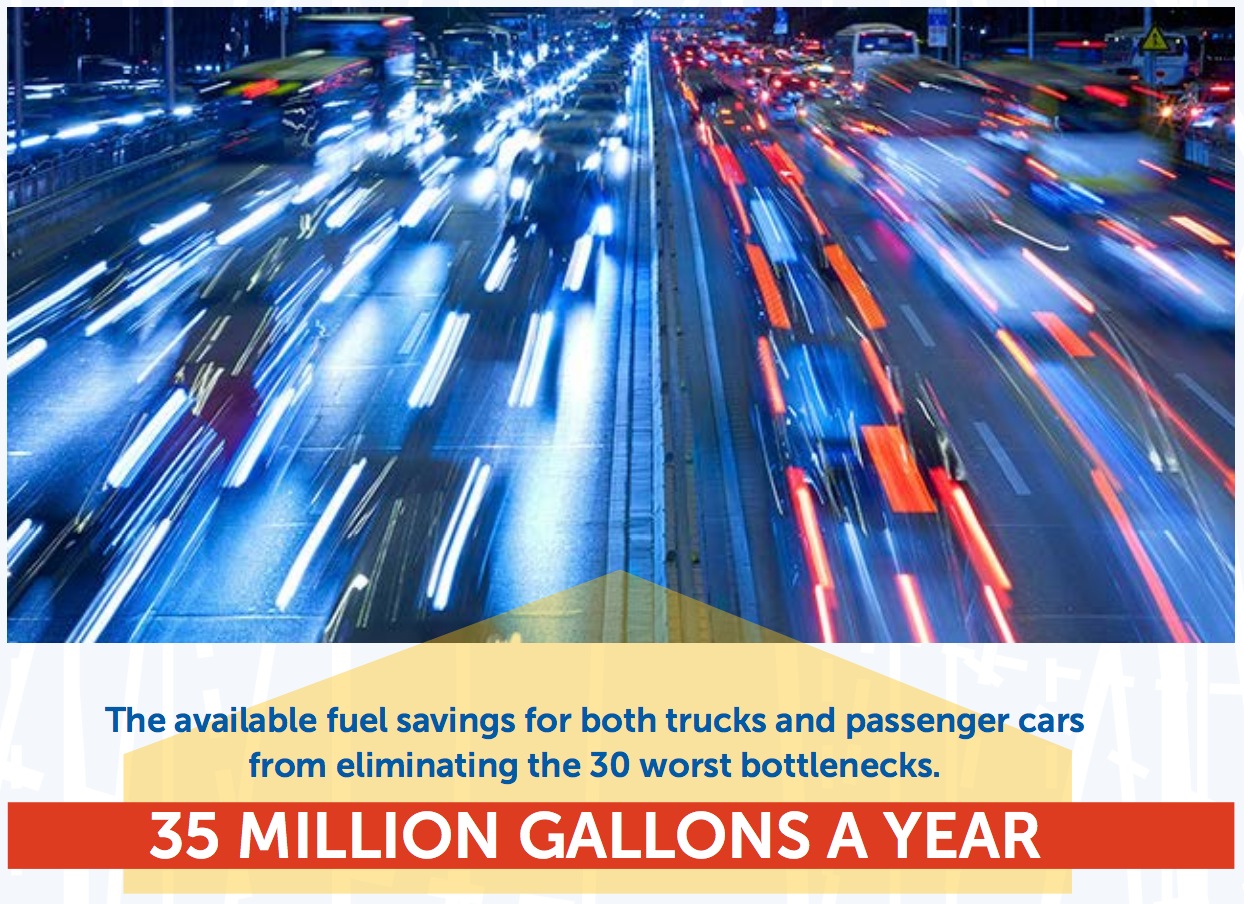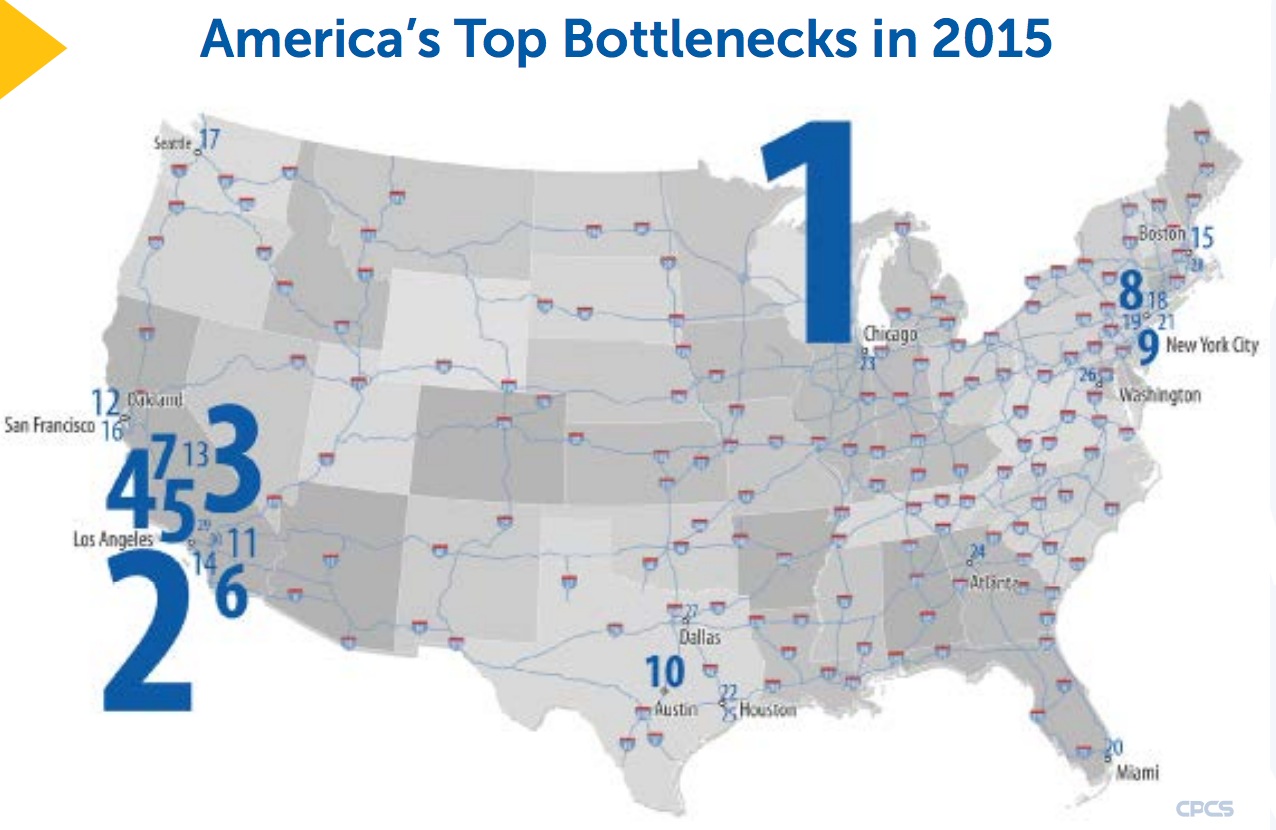AMERICAN HIGHWAY USERS ALLIANCE
Severe congestion continues to stymie passenger and freight movement on many of America’s critical urban Interstates and freeways. This 2015 update to Unclogging America’s Arteries identifies the 50 worst highway bottlenecks in the U.S. and demonstrates that the cost of doing nothing is too significant to ignore.
Bottlenecks impose massive delays and costs on U.S. drivers and businesses.
This study assessed congestion on urban Interstates and other access controlled highways using observed vehicle speed data from 2014. The top 30 metro-area bottlenecks each cause at least one million hours of delay per year, and three million on average. The worst bottleneck in Chicago, Illinois experiences nearly 17 million hours of delay per year. We profile these hotspots in detail. Drivers stuck on these roads altogether experience delays of about 91 million hours every year, the equivalent of 45,500 person-work years. The lost value of time to the economy from congestion in this handful of locations is upwards of $2.4 billion annually—or enough each year to fund several major transportation solutions to alleviate congestion.
Severe localized bottlenecks stand out.
The top bottlenecks are mostly concentrated in our largest cities. The nation’s worst bottleneck is a 12-mile stretch of the Kennedy Expressway (I-90) in Chicago, between the “Circle” Interchange (with I-290) and the Edens Junction (at I-94). It was among the most severe even in 2004, and outranks the others in our 2015 list both in terms of total delays as well as queue length.5 Eleven of the 30 most severe bottlenecks are in the Los Angeles region, six of them among the top 10. The New York metropolitan area is home to five bottlenecks in the top 30. The I-35 corridor running through downtown Austin, Texas is number 10 on the list with about 3 million hours of annual total delay.
Congestion is not just a metropolitan problem.
Small growing cities and some rural areas also experience high-levels of delays and associated costs. We also identify other bottlenecks in many US states. These congestion zones impose significant costs on local drivers and the local economy.
Alleviating congestion unlocks economic, environmental, and safety benefits.
In addition to freeing up drivers’ valuable lost time for other productive work or leisure, reduced congestion saves fuel and curbs greenhouse gas emissions. Eliminating congestion in the nation’s top 30 bottlenecks alone can save more than 35 million gallons of fuel every year and reduce by about 740 million pounds the CO2 emitted from both trucks and passenger cars. These benefits roughly amount to 830 million gallons in fuel savings and 17 billion pounds in avoided CO2 emissions over the next two decades. The present value of time that could be regained is $39 billion.
Targeted investments in technology and capacity can provide relief on the most severe segments.
In its 2014 Cost of Congestion report, the American Transportation Research Institute (ATRI) determined that 89 percent of truck-related congestion costs were associated with only 12 percent of road miles traveled. This suggests that efforts can be focused on the most problematic areas. Most of these solutions do not automatically imply large investments in highway capacity additions or mass transit projects. In fact, many solutions are designed to simply make existing capacity more efficient. Information and communications technologies have made it easier than ever before for drivers and system operators to make informed choices, with much of the infrastructure already in place. What is needed is cohesive, systematic thinking with the resolve to infuse resources in cost-effective, high-impact investments.
Download full version (PDF): Unclogging America’s Arteries 2015
About the American Highway Users Alliance
www.highways.org
The American Highway Users Alliance is a nonprofit advocacy organization serving as the united voice of the transportation community promoting safe, uncongested highways and enhanced freedom of mobility.








 RSS Feed
RSS Feed